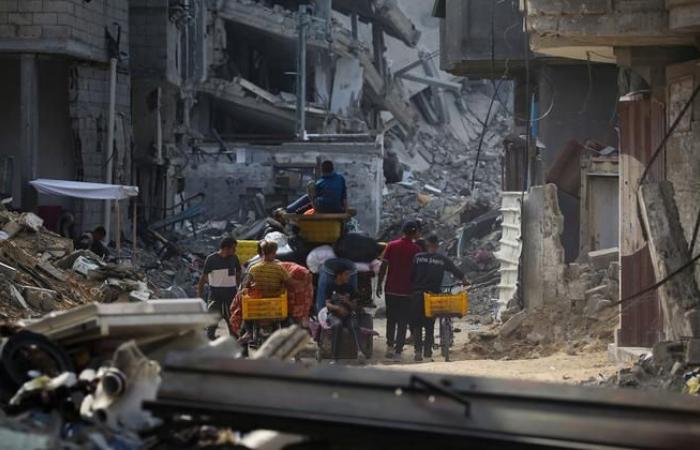Israel prevents the UN from collecting garbage from landfills in Gaza, which is causing “extremely terrible” sanitary conditions that raise fears of a greater spread of diseases.
Piles of garbage rotting in the heat are piling up across the Strip among the displaced, a UN refugee agency (UNRWA) worker said in the Strip on Friday.
Israel has repeatedly refused to allow this agency to empty the main landfills, explained spokeswoman Louise Wateridge, so other temporary ones are emerging, which they also cannot clean due to Israeli limitations on the import and distribution of fuel.
“When I look outside, 150 metres away there is a huge temporary landfill and people live among that rubbish. There is no place for the rubbish, it is among the people and the problem keeps getting worse. And As the temperature rises, the misery that people have to endure is increasing. People live among garbage, surrounded by trash. It is a very difficult situation. In addition, people build shelters with plastics and the temperature inside is even higher than outside. “They are really unbearable conditions.”
Increased risk of disease
In this regard, the World Health Organization has warned of the enormous risk of water-borne diseases such as diarrhea, contamination of scarce food supplies, increased mosquito numbers and heat stroke.
“It is a very difficult combination of not having water, garbage everywhere and high temperatures. It can cause the appearance of various communicable diseases,” said spokesman Tarik Jašarević, mentioning that about 470,000 cases of diarrhea have been recorded since the beginning of the war.
Anarchy and looting
Louise Wateridge went on to confirm reports of the collapse of law and order after almost nine months of intense Israeli bombing, which has disrupted normal life in Gaza and caused people to resort to stopping aid trucks in search of food once they cross into Gaza through Kerem Shalom.
“The road was full of looters when we arrived. We arrived at the same time as some aid trucks, so there were hundreds of armed men waiting for them to arrive. The trucks we passed on the road were destroyed: the windshields were completely smashed, they all had metal bars reinforcing the driver’s area.”
All UN buildings damaged or destroyed
Moving deeper into Gaza, Wateridge described the damage inflicted on UN facilities along the route from Kerem Shalom to Khan Younis and Deir al Balah, with some riddled with large holes from shelling and others destroyed.
“Each and every UNRWA facility, schools, warehouses, food distribution centers, etc., suffered considerable damage or even destroyed. Bullet holes, burst walls, floors collapsed like pancakes on top of each other… “You would have no idea that these are UN facilities, protected by international law.”
Lack of fuel
According to the Office for the Coordination of Humanitarian Affairs (OCHA), since the beginning of 2024 only 14% of the fuel (diesel and benzene) that used to enter Gaza monthly before October 2023 (two million liters versus 14 million liters).
“We have no fuel, so we can’t go anywhere, none of the humanitarians,” Wateridge said, confirming that aid operations continue to be hampered by the difficulty of recovering fuel from Kerem Shalom.
“For UNRWA, there are plans to distribute what we have – food and mattresses – but it is very limited. It is another testament to how bad the humanitarian response is, when we don’t even have enough fuel to move around.”
In addition to these challenges, UNRWA workers are facing their own problems, Wateridge said. “I’m looking forward to seeing them; they are fine, but very traumatised by being displaced from Rafah. And now they have nothing left.”


